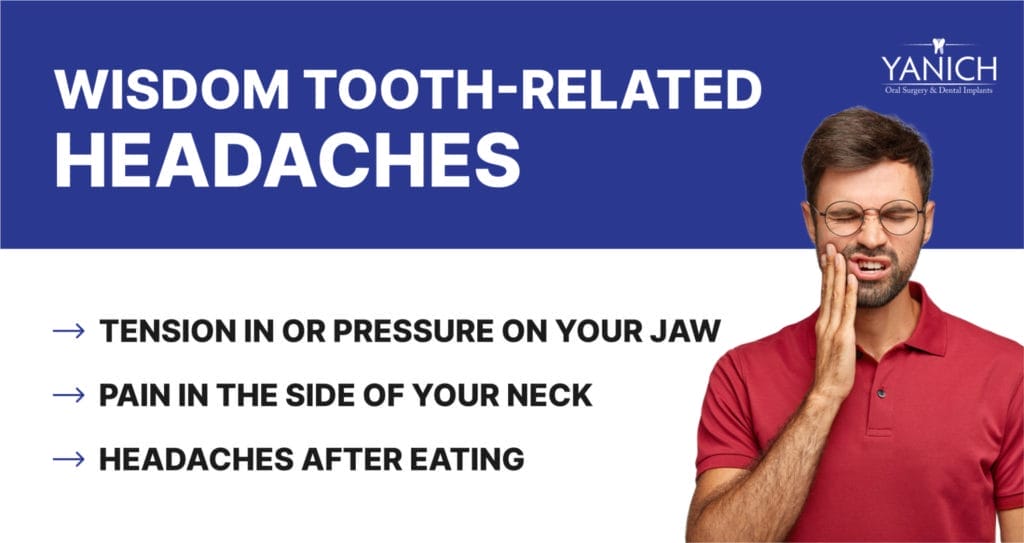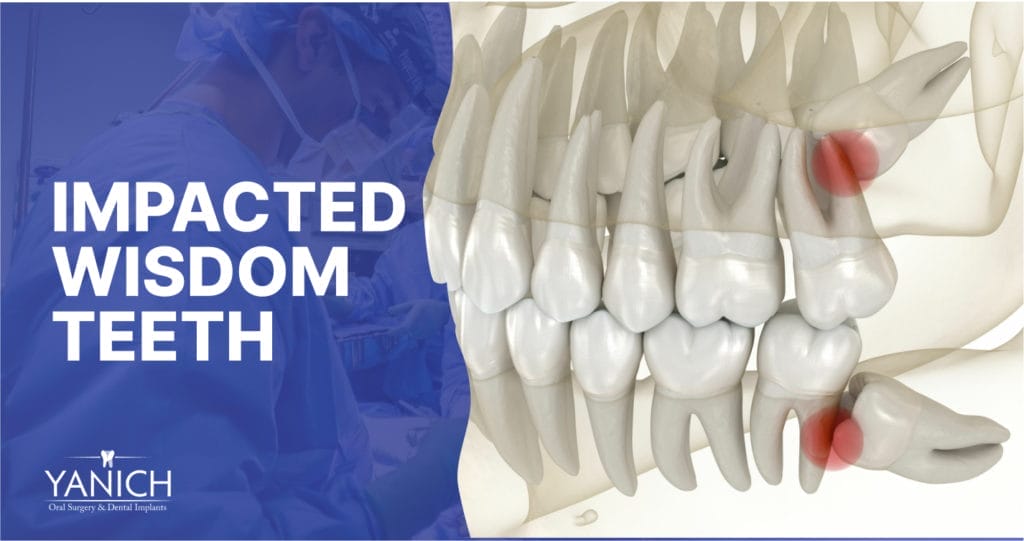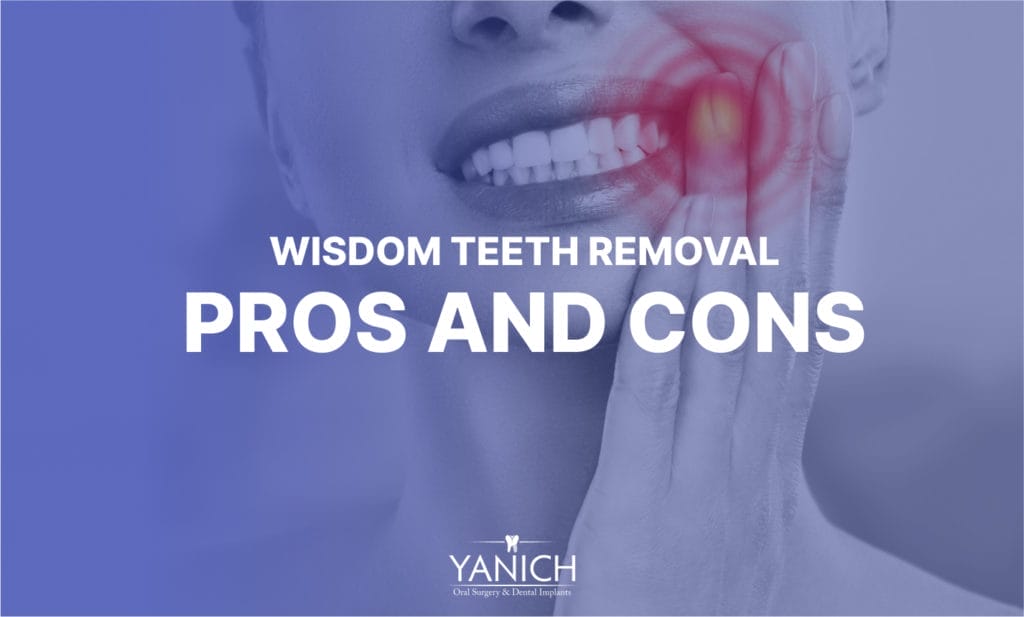Many people wonder, “Can wisdom teeth cause headaches?” This article will explore the connection between wisdom teeth and headaches, identify critical symptoms, and discuss effective treatment options.

How Wisdom Teeth Can Lead to Headaches
Wisdom teeth, the late bloomers of your dental anatomy, often appear in your late teens or early twenties. While they’re a natural part of your mouth’s development, their emergence can sometimes lead to unexpected discomfort, particularly headaches. Let’s break down how this happens.
The Emergence of Wisdom Teeth and Associated Discomfort
- Pressure on Surrounding Teeth: As wisdom teeth push through the gum line, they can exert pressure on adjacent teeth. This pressure can lead to a domino effect of discomfort, extending to the jaw and even causing headaches.
- Limited Space in the Jaw: Many people don’t have enough room in their jaws to accommodate these new teeth. This lack of space can lead to crowding, misalignment, and significant discomfort.
- Inflammation and Irritation: The process of teeth breaking through the gums can cause inflammation in the gums themselves and surrounding tissues, contributing to headaches.
Jaw Tension and Inflammation: A Recipe for Headaches
- Muscle Strain and Tension: The emergence of wisdom teeth can change how you chew and bite. This can strain the muscles in your jaw, leading to tension headaches.
- Inflammation Spreading to the Temporomandibular Joint (TMJ): The TMJ, located just in front of your ears, plays a crucial role in your jaw’s movement. Inflammation from emerging wisdom teeth can affect this joint, resulting in headaches.
- Sinus Issues: Upper wisdom teeth are situated close to the sinuses. They can push against the sinus walls as they grow, potentially leading to sinus headaches.

Identifying Wisdom Tooth-Related Headaches
These symptoms are often distinct and can guide you in determining whether your wisdom teeth are the root cause of your pain.
Tension in or Pressure on Your Jaw
The emergence of wisdom teeth often leads to noticeable pressure or tension in the jaw, particularly around the back of the mouth where these teeth grow. This tension isn’t just localized; it can radiate, causing broader jaw discomfort and headaches. The pain may become more pronounced when chewing or opening your mouth wide. This continuous pressure from the emerging or impacted wisdom teeth can trigger tension headaches, often characterized as a constant, dull ache on both sides of the head.
Pain in the Side of Your Neck
When wisdom teeth cause discomfort, it’s not just your jaw that’s affected. The muscles in your jaw and neck are interconnected, so pain can quickly radiate to the neck. You might notice a dull, aching pain on one side of your neck, directly resulting from the stress and strain from your jaw. This neck pain can further contribute to or exacerbate headaches, creating a cycle of discomfort originating from your wisdom teeth, affecting a much larger area.
Headaches After Eating
Eating and chewing can become unexpectedly challenging when dealing with emerging wisdom teeth. The repetitive motion required to chew can aggravate the sensitive areas in your jaw and gums.
Consequently, you might develop a headache after a meal, especially a meal requiring extensive chewing. This is often due to the increased tension and pressure in the jaw and surrounding muscles. Observing patterns in when your headaches occur, particularly if they tend to follow meals, can be a key indicator that your wisdom teeth are the underlying cause.

Complications of Impacted Wisdom Teeth
Impacted wisdom teeth occur when back molars lack space to emerge or develop normally. They may grow at an angle, partially emerge, or remain trapped beneath the gum and bone. This impaction can happen for several reasons, including overcrowding of teeth or the wisdom tooth growing in at an incorrect angle.
The impact of these teeth can manifest in various ways, often leading to noticeable symptoms.
Common symptoms include:
- Misalignment: Impacted wisdom teeth can push against other teeth, causing misalignment or crowding, especially in the lower jaw.
- Pressure on Other Teeth: This pressure can lead to pain and discomfort in adjacent teeth and contribute to changes in the overall bite.
- Severe Headaches and Jaw Stiffness: As the impacted teeth exert pressure on the jaw, they can cause severe headaches and stiffness in the jaw area.
- Swollen Gums and Bad Breath: The area around an impacted tooth can become inflamed and swollen, leading to difficulty in cleaning, which can cause bad breath.
Risks of Ignoring Impacted Wisdom Teeth
Leaving impacted wisdom teeth untreated can lead to several serious oral health issues:
- Increased Risk of Infection: The difficulty cleaning around an impacted tooth can lead to bacterial buildup, increasing the risk of infection and gum disease.
- Damage to Adjacent Teeth: Continuous pressure from an impacted tooth can damage neighboring teeth and potentially lead to tooth loss.
- Cysts and Tumors: In some cases, cysts or tumors can develop around the impacted tooth, leading to more severe complications and requiring more complex treatment.

Wisdom Teeth Removal: Pros and Cons
If you’re experiencing pain or discomfort knowingly caused by incoming wisdom teeth, you may be interested in removing them. This information will help you decide your next step in resolving the issue.
Pros of Wisdom Teeth Removal
- Reduces Crowding and Crooked Teeth Risk: One of the most significant benefits of wisdom teeth removal is the reduced risk of crowding in the mouth. This can be particularly important for those who have had orthodontic treatment, as crowded wisdom teeth can undo the alignment achieved by braces.
- Reduces Risk of Infection or Cavities: Impacted or partially erupted wisdom teeth can be hard to clean, making them hotspots for bacteria. Removing these teeth eliminates hard-to-reach areas, reducing the risk of cavities and gum infections.
- Makes Life Easier in the Long Run: While surgery might be daunting, removing problematic wisdom teeth can lead to a lifetime of reduced dental problems, less discomfort, and overall better oral health.
Cons of Wisdom Teeth Removal
- Complication Risks with Unqualified Dentists: As with any surgical procedure, there’s a risk of complications, especially if an unqualified or inexperienced dentist performs the surgery. Choosing a skilled and reputable oral surgeon to minimize these risks is crucial.
- Anesthesia Requirements: The procedure requires anesthesia, which carries its own set of risks and can be a source of anxiety for some patients. Discussing these concerns with your dentist can help alleviate some of this anxiety.
- Temporary Discomfort After the Procedure: After wisdom teeth removal, post-surgical discomfort, swelling, and a brief recovery period are joint. While these effects are typically short-lived, they are essential to consider when planning the procedure.
Understanding the Impact of Wisdom Teeth on Headaches
It’s not a myth; wisdom teeth can cause headaches, and the decision to remove wisdom teeth, while not without its considerations, often emerges as a proactive step towards mitigating these discomforts and preventing further complications. It’s a testament to the importance of timely dental intervention and the need for individual assessment by dental professionals. As we navigate our dental health journey, understanding the role of wisdom teeth and their potential impact is crucial for making informed decisions that enhance our overall quality of life and health.
If you need wisdom teeth removal, reach out to Yanich Oral Surgery, the best oral surgeon in Marion, OH, and surrounding areas.


